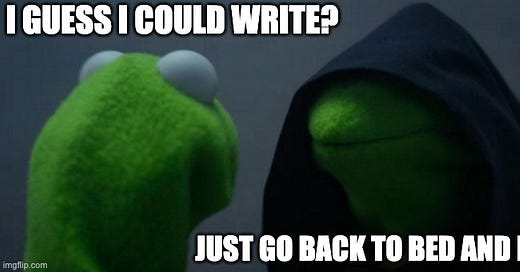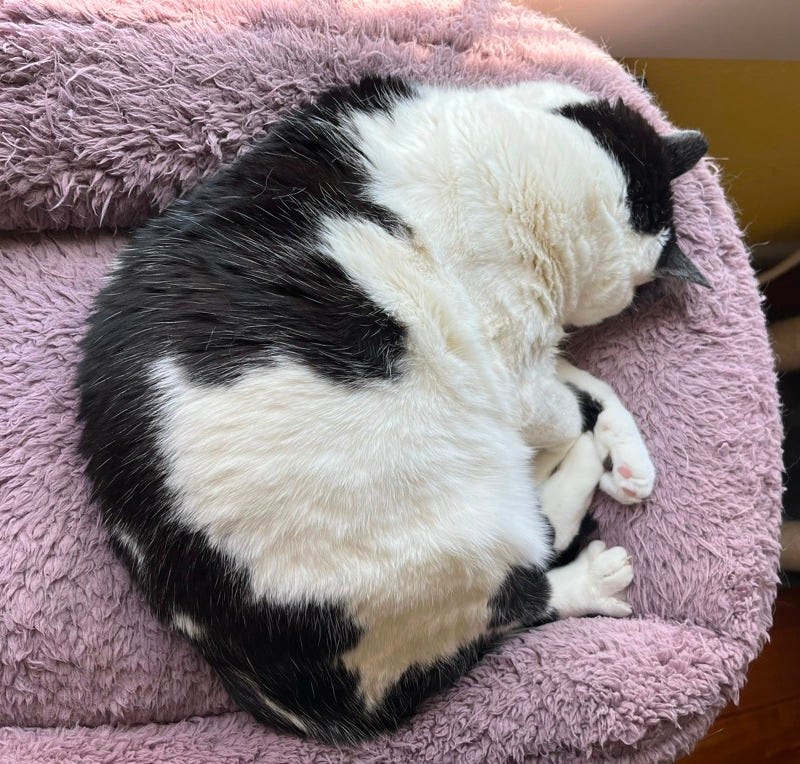Things are unsettled — globally, of course, but also here in my small corner of the world. The library where I work has laid off a number of part-time staff, and our open hours are contracting (which, in turn, means that my writing/life schedule is changing). I find change like this difficult. We probably all know that Annie Dillard quote:
How we spend our days is, of course, how we spend our lives. What we do with this hour, and that one, is what we are doing.
But I am even more fond of the rest of the quote:
A schedule defends from chaos and whim. It is a net for catching days. It is a scaffolding on which a worker can stand and labor with both hands at sections of time. A schedule is a mock-up of reason and order—willed, faked, and so brought into being; it is a peace and a haven set into the wreck of time; it is a lifeboat on which you find yourself, decades later, still living.
So when my schedule is off-kilter, I very much feel the loss of my “peace and haven.” I surrender to “chaos and whim,” default to easy/passive activities — to opting out rather than leaning in.
Sometimes I just let myself: opt out, stay in bed reading, scroll more than I should. That’s been almost the last month over here, feeling low and destabilized.
But after a few weeks of mainlining romance novels1, I am ready to start clawing my way back to a schedule. How to do it, though, when the world (near and far) remains unsettled and uncertain?
I think all of my strategies for getting myself back to the page, back into creative practice, are really about lowering the stakes.
I am always looking for ways to lower the bar, so that if I try and “fail,” there’s no real disappointment. Most of this is mental trickery and self-delusion. But the trickery, historically, has worked for me!
Get off the computer and go back to a journal
Get out of the journal, and onto scratch paper
Fold the scratch paper up into a 1-page zine and put a different idea on each tiny page
Write on notecards
Use pencil instead of pen
Make lists of ideas, not even complete sentences
Go for a story walk (this is where I go for a walk and pretend to answer interview questions about a book I haven’t finished)2
Reread a favorite craft book
Instead of journaling (or, God forbid, bullet journaling), I only write down 3 things I did every day
Reverse outline a book I feel strongly about (good or bad)
Read writing exercises3
Dabble in alternative genres or forms
Write 15 first sentences of stories (the number being more important than any of them being good). Repeat for several days
Sit at the desk (no computer, remember) for 20 minutes (that’s it — I just have to stay at the desk the whole time, and hope I get bored enough to think about writing)
Will all of this bring me back to the page in a more sustained way? Will it help me sink into whatever the next project is? I hope so, I very much hope so. In lowering the stakes, the pressure to be “smart” or “good” or “talented” retreats a little. I’m just playing again.
If I’m just scribbling ideas in pencil on a piece of scratch paper, it doesn’t need to look like good prose, or a novel. It’s just a few sentences — maybe even just fragments — on a page. It’s hard to mess that up.
How do you lower the stakes? How do you help yourself get back to the page after time away, or when things are unsettled around you?
In other news…
My library just put on our first-ever all-ages Drag Loteria, complete with protesters (🤮) and counter-protesters (all my love to CV Pride, who showed up in such wonderful force). I’m so grateful to the amazing performers, to the 150+ members of the community who came to play and dance, and all of the teen volunteers who helped serve food and decorate and hand out rainbow leis.
R and I trapped and fixed another of the neighborhood cats, bringing this year’s count up to five ferals fixed!
I also spent many hours this month working on a Secret Project for the book4, and am just now — as I type this — realizing that some of this current ennui might be burnout in the wake of all that work? Bookish news has otherwise been fairly quiet. I’m hoping to spend July playing around, trying on some ideas.
How is your summer? What are you reading or watching? What is blooming in your neighborhood?
With love,
portia
An excellent antidote to feeling unsettled — predictable endings, clear tropes!
I am moderately embarrassed to admit this! But also! Thinking about how I would talk about a story helps me to see and understand the story.
Do I actually do the exercises? Rarely! Are they useful? Almost always.
It’s a game, a bonus scene as a computer game







